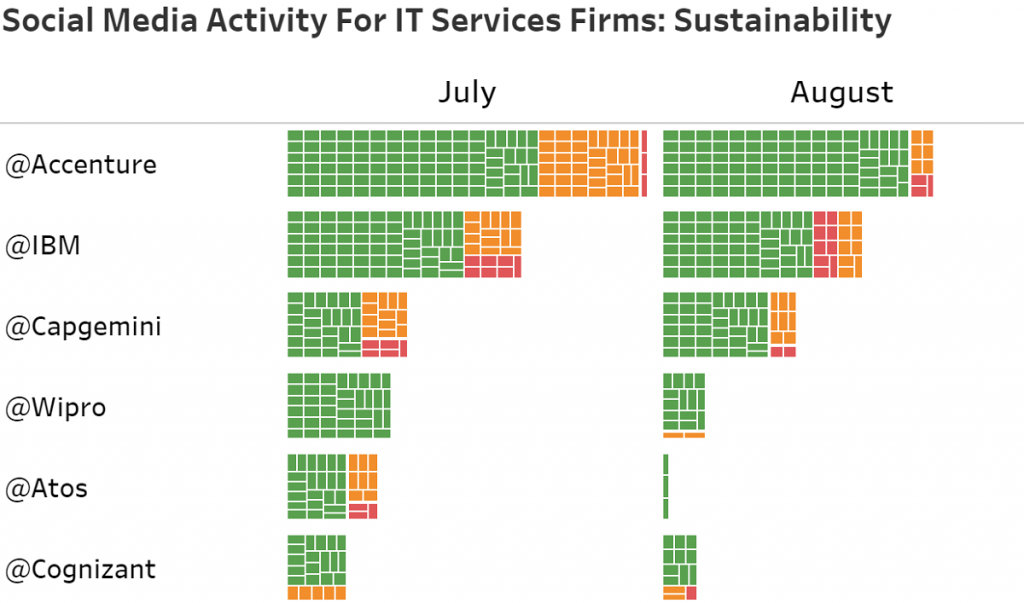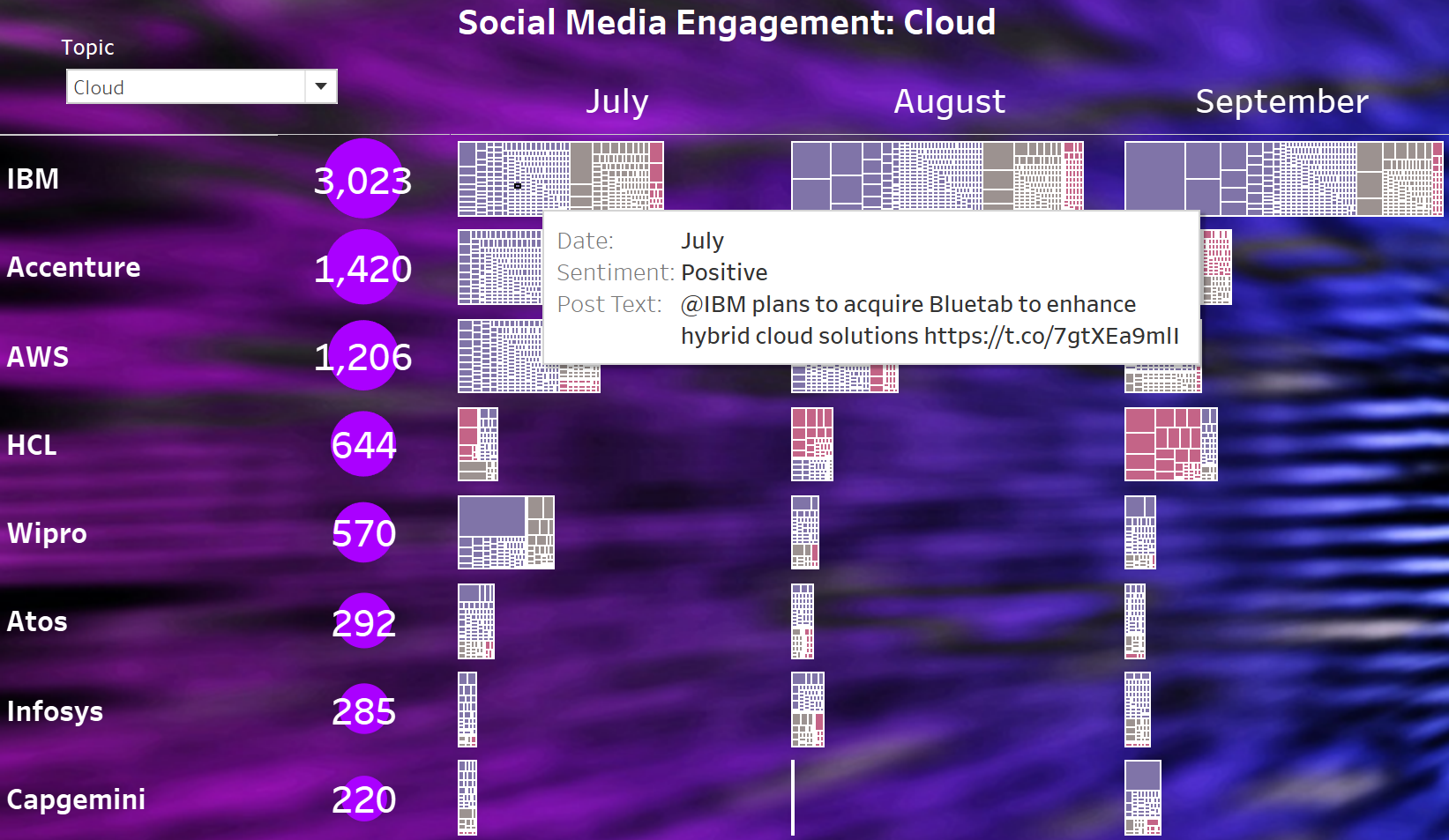With sustainability moving higher up the C-Suite agenda, the leading IT Services firms recognise the need to plot out their green journey.
For some, such as Infosys, this has seen a sweeping internal mission to achieve carbon neutrality- a target it claims to have reached 30 years ahead of target in 2020. Others are starting to shift their attention to the more active role their business can play in helping clients meet their sustainability goals. Accenture, which has been playing in the space for some time, has since been joined by its peers. Atos, for example, acquired sustainability consultancy EcoAct in late 2020, and by mid-2021, set into motion plans that will see sustainability-related services contribute 1% to the firm’s revenues.
In truth, all of the leading providers are pushing their sustainability messaging deep into the marketplace. Whether that’s highlighting the role IBM Watson will play in sustainable agriculture, or Google Cloud lifting the veil on how many of its data centres are powered by renewable energy – and letting clients align their goals by picking which server farms they would like to route their data through.
But what is the impact of this messaging? And is it finding its audience? Our latest research digs into key social signals to understand the market sentiment around the sustainability-focused announcements, investments, and strategies of the leading IT Services firms. Let’s take a quick look at the latest data from Twitter. The chart is interactive so will show you the source posts if you touch them – on small devices rotate to landscape and refresh to get the full effect!
[iframe width=”650″ height=”860″ seamless frameborder=”0″ scrolling=”no” src=” https://public.tableau.com/views/sustainability_16299717262290/SustainabilityChart2?:language=en-GB&publish=yes&:display_count=n&:origin=viz_share_link&:showVizHome=no&:embed=true”]
Source: Market Prescience analysis of Twitter*
At a glance, there are some clear winners. Accenture is clearly leading the charge – the firm not only has the most positive interactions, but also the most interactions overall. The firm is perhaps one of the most mature when it comes to social media communications – which partially explains this result. But digging deeper it’s also clear that Accenture has ramped up sustainability-focused solutions and thought leadership such as the use of 3D printing to reduce resource burdens. In addition, the firm has created solid messaging around impact through case studies – like using cloud technology to drive down carbon emissions.
IBM is a close second, with the rest of the pack trailing these two. The firm benefits to an extent from the network effect, with many companies including leading services firm’s deploying IBM technology to deliver sustainability solutions. It’s also fair to say IBM has taken the push towards sustainability in its stride and embedded new capabilities in its innovation roadmap. The firm also announced a partnership with SAP to help enterprises cut greenhouse gas emissions – which received some positive engagement on social media channels. Indeed, many of the positive engagements in the space originate from announcements made at SAP’s Innovation awards.
Taking a look at a handful of the other leading firms – Capgemini is considerably ramping up messaging around sustainability, particularly among its new Intelligent Industry offerings supported by the recent acquisition of Altran. The firm also announced a partnership with SAP geared to supporting clients on their sustainability journey. Plus the release of a report on how artificial intelligence can power enterprise climate action strategies also received favourable engagements.
Wipro too is moving forward with sustainability, and particularly the role it plays as a core building block of its solutions, into a key focal point of their messaging. Wipro also enjoyed a boost in positive impact based on plaudits won at the SAP innovation awards.
Meanwhile, Atos is arguably the most bullish, at least recently, on the potential business opportunities attached to sustainability services, pegging significant revenue targets on the business line. The firm is gaining more mindshare by pushing next-generation technology use cases in the sustainability space – such as the use of Quantum Computing. The firm also enjoyed positive social commentary on its ongoing strategy of shifting pension investments into net-zero. It is important to maintain the momentum of its sustainability messaging given the highs from July.
For Cognizant, a large chunk of the positive engagement originates from the firm’s Future of Work thought leadership team – who continue to push sustainability content into the market. The firm’s partnership with Aston Martin has also helped drive engagement towards the brand and open opportunities to discuss the broader innovation work behind the scenes that can enable new sustainable capabilities in the modern business environment.
For TCS, the firm opening up an innovation centre in Amsterdam helped drive some engagement – mainly as the centre will focus, in part, on supporting sustainable business models. The firm’s thought leadership on using digital twins to support more sustainable decision making, and highlighting the positive carbon footprint reduction seen through working from home also drove considerable engagement.
Finally, Infosys enjoyed positive interactions from several case studies – particularly work supporting leading agricultural firms. In addition to a broader recognition of the firm’s ambitious and practical internal sustainability initiatives. However, this has not translated very clearly into large volumes of Twitter engagement on the topic recently, especially given Infosys’s enormous social media presence.
In terms of negative impact across the board, sustainability remains an emotive topic. Even positive announcements are met with criticism online for not going far enough or at the speed and scale needed to make an impact. It’s also worth noting that several of the firms witnessed an uplift in negative impact not as a direct result of their sustainability strategy or investments, but from the shockwaves of negative publicity elsewhere – particularly, several contracts where social sentiment is already low.
*Methodology. Market Prescience analysed the activity of the service provider’s primary social media handles on Twitter since the 4th July 2021. Using the Vader sentiment analysis tool to determine whether the tweets are broadly positive, negative, or neutral. Market Prescience used keywords contained within the posts to determine whether it concerned sustainability. The keywords used were: biodegradable, biodiesel, biomass, byproduct, carbon emissions, carbon footprint, carbon offsets, circular economy, climate change, climate positive, closed-loop, composting, conservation, deforestation, eco-conscious, eco-friendly, ecological footprint, energy-efficient, environmental impact, fair trade, freecycle, global warming, green, natural resources, net-zero, organic, post-consumer, preservation, reclaimed, recycle, reduce, reforestation, renewable energy, single-use, sustainability, vegan, and zero-waste. The algorithm removes identical tweets – so basic retweets are excluded, but it will include retweets that have any differences. Another caveat involves the nature of any machine learning or classification technique – the analysis may include some posts falsely classified in the sustainability pot and the sentiment may not always be accurate. One area the sentiment analyser was confused about sustainability post was where the outrage with the topic trumped the positive actions that were being taken in some cases. But the idea here is to quickly show the macro trends through the aggregate rather than obcess on each data point, although we expect the process to improve over time.
This is the first in a series of posts analyzing social media activity around major topics impacting the technology market. Looking at artificial intelligence, automation, security, and cloud over the coming weeks. Plus more general analysis from company financials and social media.




